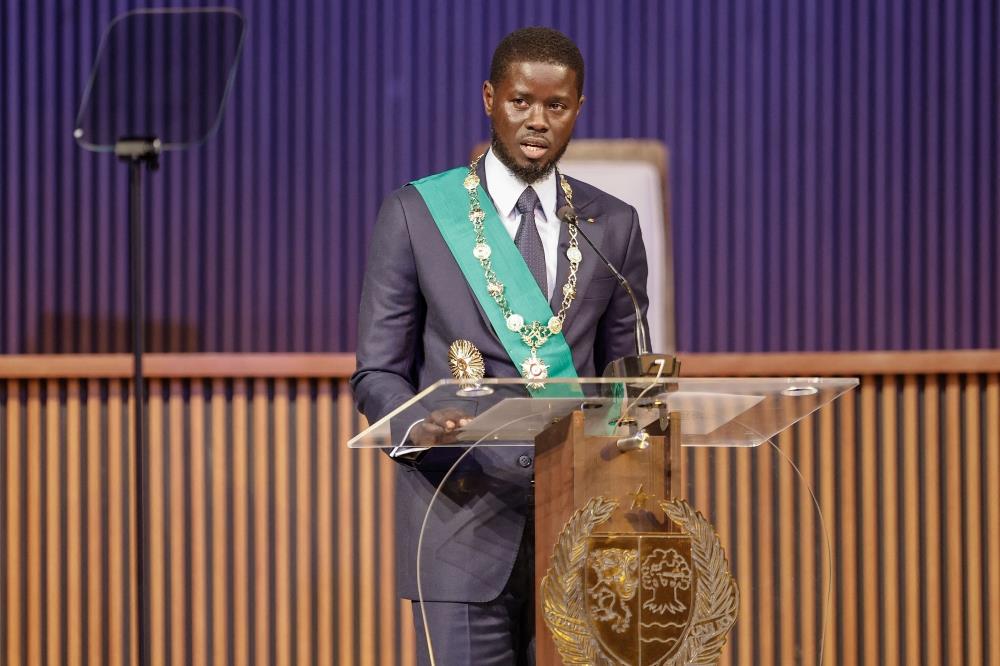
Senegal's Youngest President Faye Vows Systemic Change, Sovereignty
Dakar: Left-wing pan-Africanist Bassirou Diomaye Faye on Tuesday became Senegal's youngest president, pledging systemic change, greater sovereignty and calm after years of deadly turmoil.
The 44-year-old, who has never before held an elected office, swept to a first-round victory on a promise of radical reform just 10 days after being released from prison.
Faye took the presidential oath in front of hundreds of officials and several African heads of state at an exhibition centre in the new town of Diamniadio, near Dakar.
Bassirou Diomaye Faye (L) is sworn in as Senegal's President at an exhibition centre in the new town of Diamniadio near the capital Dakar on April 2, 2024. (Photo by John WESSELS / AFP)
He then returned to the capital, with his motorcade greeted by hundreds of jubilant residents who lined the roads leading to the presidential palace. His predecessor, Macky Sall, symbolically handed Faye the key to the presidential headquarters before leaving the palace.
"Before God and the Senegalese nation, I swear to faithfully fulfil the office of President of the Republic of Senegal," Faye had said earlier in the day.
The former tax inspector becomes Senegal's fifth president since independence from France in 1960 and the first to openly admit to a polygamous marriage.
"I am aware that the results of the ballot box express a profound desire for systemic change," Faye said in a brief speech after taking the presidential oath.
"Under my leadership, Senegal will be a country of hope, a peaceful country with an independent judiciary and a strengthened democracy," he added.
Faye was among a group of political opponents freed from prison 10 days before the March 24 presidential ballot under an amnesty announced by former president Macky Sall, who had tried to delay the vote.
"I have painful memories of the martyrs of Senegalese democracy, the amputees, the wounded and the former prisoners," Faye said Tuesday, referring to the past three years of political unrest that left dozens dead and hundreds arrested.
"I will always bear in mind the heavy sacrifices made in order never to disappoint you," he added.
Faye said he clearly heard the "aspiration for greater sovereignty, development and well-being" in Africa and re-iterated to foreign partners "Senegal's openness to trade that respects our sovereignty and meets the aspirations of our people, in a mutually beneficial partnership".
Commonly known as Diomaye, or "the honourable one", his promise of radical change won the election with 54.3 percent of the vote.
Reconciliation, sovereignty
Working with his populist mentor Ousmane Sonko, who was barred from the election, Faye had set out his priorities of national reconciliation, easing a cost-of-living crisis and fighting corruption.
He has also vowed to restore national sovereignty over key assets such as the oil, gas and fishing sectors.
Senegal is due to start hydrocarbon production later this year.
Faye also wants to replace the CFA franc, which he sees as a French colonial legacy, with a new common regional currency, and to invest more in agriculture with the aim of reaching food self-sufficiency.
After three tense years in the traditionally stable nation, his democratic victory has been hailed from Washington to Paris, via the African Union and the European Union.
On the international stage, Faye seeks to bring military-run Burkina Faso, Mali and Niger back into the fold of the regional Economic Community of West African States (ECOWAS) bloc.
On Tuesday, he urged "more solidarity" between African countries "in the face of security challenges".
The military regimes in Mali, Burkina Faso and Guinea all sent representatives to Diamniadio, including Guinean president General Mamady Doumbouya.
Burkina Faso's leader Captain Ibrahim Traore wrote on X, formerly Twitter, that Faye's mandate represented a "symbol of a new era for an uninhibited, free and sovereign Africa".
He added he was ready to work together on "the renovation of sub-regional and international cooperation".
UN Secretary-General Antonio Guterres hailed the inauguration as "a testament to the Senegalese people, that they fought for their right to vote," his spokesman Stephane Dujarric said.

Legal Disclaimer:
MENAFN provides the
information “as is” without warranty of any kind. We do not accept
any responsibility or liability for the accuracy, content, images,
videos, licenses, completeness, legality, or reliability of the information
contained in this article. If you have any complaints or copyright
issues related to this article, kindly contact the provider above.

















Comments
No comment